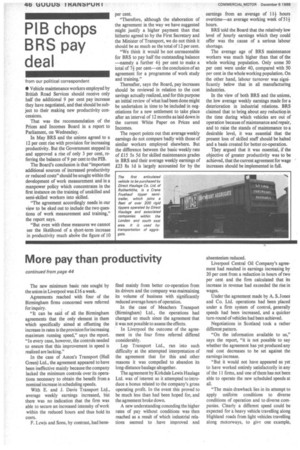PIB chops BRS pay deal
Page 48

If you've noticed an error in this article please click here to report it so we can fix it.
from our political correspondent • Vehicle maintenance workers employed by British Road Services should receive only half the additional 9 per cent pay increase they have negotiated, and that should be subject to their making new productivity concessions.
That was the recommendation of the Prices and Incomes Board in a report to Parliament, on Wednesday.
In May BRS and the unions agreed to a 12 per cent rise with provision for increasing productivity. But the Government stepped in and approved a rise of only 3 per cent, referring the balance of 9 per cent to the PIB.
The Board's conclusion is that "important additional sources of increased productivity or reduced costs" should be sought within the development of work measurement and in a manpower policy which concentrates in the first instance on the training of unskilled and semi-skilled workers into skilled.
"The agreement accordingly needs in our view to be eked out to include the two questions of work measurement and training," the report says.
"But even with these measures we cannot see the likelihood of a short-term increase in productivity much above the figure of 10 per cent.
"Therefore, although the elaboration of the agreement in the way we have suggested might justify a higher payment than that hitherto agreed to by the First Secretary and the Minister of Transport, we do not think it should be as much as the total of 12 per cent.
"We think it would be not unreasonable for BRS to pay half the outstanding balance —namely a further 44 per cent to make a total of 7+ per cent—on the conclusion of an agreement for a programme of work study and training."
Thereafter, says the Board, pay increases should be reviewed in relation to the cost savings actually realized, and for this purpose an initial review of what had been done might be undertaken in time to be included in negotiations for a new settlement to take place after an interval of 12 months as laid down in the current White Paper on Prices and Incomes.
The report points out that average weekly earnings do not compare badly with those of similar workers employed elsewhere. But the difference between the basic weekly rate of £15 5s 5d for skilled maintenance grades in BRS and their average weekly earnings of £23 8s id is largely accounted for by the earnings from an average of 114 hours overtime—an average working week of 51+ hours.
BRS told the Board that the relatively low level of hourly earnings which they could offer was the cause of a serious labour shortage.
The average age of BRS maintenance workers was much higher than that of the whole working population. Only some 30 per cent were under 40, compared with 50 per cent in the whole working population. On the other hand, labour turnover was significantly belOw that in all manufacturing industries.
In the view of both BRS and the unions, the low average weekly earnings made for a deterioration in industrial relations. BRS claimed that to bring about any reduction in the time during which vehicles are out of operation because of maintenance and repair, and to raise the stands of maintenance to a desirable level, it was essential that the present loss of skilled staff should be halted and a basis created for better co-operation.
They argued that it was essential, if the objective of greater productivity was to be achieved, that the current agreement for wage increases should be implemented in full.








































































































































































